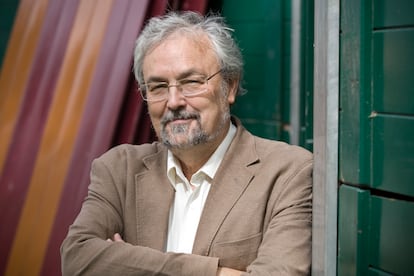Robin Dunbar, anthropologist: ‘A good network of friends increases your life expectancy’
The British researcher defends the validity of his most famous theory, 30 years after formulating it. Despite social media, he explains that humans can only have a maximum of 150 friends

In 1993, Brazilian singer Roberto Carlos sang: “I want to have a million friends, so that I can sing louder.” But that same year, in cold and faraway England, Robin Dunbar, an anthropologist and primatologist from Oxford University, proclaimed that such a desire was impossible. He noted that humans cannot have more than 150 significant relationships at a time.
In the end, the song was a hit… and so was the theory of 150 friends. So much so that it became popularly known as “Dunbar’s number.”
More than 30 years have passed since then, while many things have changed. In Brazil, it’s no longer Roberto Carlos, but rather Anitta who’s the most internationally-known artist. And she doesn’t sing hymns to friendship, but danceable hits like I’d Rather Have Sex. Social media made us believe that we could have thousands of friends (with the concept of “friend” eventually changing to the concept of “follower”). The world began to move faster — people began to have less free time. The theory of “liquid modernity” became popular, which speaks of a provisional world eager for novelty, in which immutable institutions such as work, love, or friendship are transitory.
Then, a pandemic broke out, forcing us to lock ourselves up at home and value the importance of human connections. In the United States, people began to talk about a “friendship recession” — a phenomenon that is especially acute among men. According to a survey by Gallup and the Survey Center on American Life, the percentage of men who claim to have at least six close friends has been halved between 1990 and 2022. One in five singles say they have no close friends. So, in this context, is Dunbar’s number still valid?
Dunbar, 77, is still convinced that this is the case. The Liverpool-born researcher says so during a video call with EL PAÍS. “The problem isn’t about memory, time, or technology, but in the ability to manage relationships. That hasn’t changed,” the anthropologist explains.
There are those who disagree. A recent study published in the scientific journal Biology Letters refuted this idea, stating that the number could be much higher. It’s one of the few scientifically argued rebuttals that Dunbar’s number has received in the past three decades… although the author denies the major criticism and calls this new study “crazy.”
Dunbar came up with his eponymous number almost by accident. He was trying to find out why primates spend so much time and effort grooming each other. It was then that he began to familiarize himself with the social brain hypothesis, which maintains that some apes have large brains because they live in socially complex societies. Essentially, groups are more or less large in direct relation to the size of an area of the brain called the neocortex. Hence, the volume of the human neocortex allowed him to extrapolate that we are programmed to move around in groups of 150 individuals.
Dunbar argues that there’s no social media platform capable of changing these numbers. “In fact, the strange thing is that, in these virtual spaces, we replicate what we’ve been doing all our lives in face-to-face relationships.” In a 2016 study, Dunbar and a team of fellow anthropologists went into the bowels of social media to check it out. “We saw that there are the same layers [and] the same frequencies of contact as when we talk about face-to-face relationships,” the expert says. “But on second thought, this can be more disturbing, because you see that these technologies are replacing physical contact.”
Social media has proven to be a very useful tool when it comes to objectively analyzing how we relate to each other. All studies on friendship in the past were carried out with questionnaires, a format that introduced certain biases and interferences. But in recent years, our cell phone has left an objective trace of how, how much, and with whom we relate. It has X-rayed our friendships.
In 2019, Dunbar participated in another study in which nearly 30 million calls between 2.5 million users were analyzed. The results showed a preference for choosing friends of the same age and gender. “We tend to look for friends who are like us,” he confirms. And this goes from biological traits to identity traits, because “we prefer people who have the same vision of the world, the same musical tastes, the same sense of humor.”
Dunbar sees friendship as an onion. That’s why he divides our groups of friends into layers. At the core, we find an intimate circle of five people: those who we turn to in moments of existential crisis. “Sometimes, it’s family members. It could be close friends, or your partner,” he explains. This circle remains relatively stable throughout life, with changes occurring approximately every 10 years. If you have a best friend and they move away, or you break up with your partner, you suddenly have a gap.
“Somehow, over time, you fill that gap, usually with a person from the layer immediately below,” he explains. This would be a layer of approximately 10 people with whom we share most of our social activities: trips to the theater, dinners, or hikes. The next layer — consisting of around 50 people — “represents our weekend group: the folks we would invite to a barbecue, or a big party,” he clarifies. And, finally, we come to the layer of 150 people, our entire social network. These are the acquaintances that “we could invite to a massive party,” or “greet without hesitation at an airport.”
Dunbar emphasizes that maintaining these connections requires time and effort: “You have to keep in touch regularly, at least once a week,” he stresses. Otherwise, relationships weaken and people move on to more external layers, eventually disappearing from our social circle. That’s why he explains that, if you try to expand your network to acquire new friends, you’ll inevitably lose some old ones. You cannot have infinite friends, because your time and capacity are limited.
All these ideas have been reflected in his book, Friends: Understanding the Power of our Most Important Relationships (2022), in which he analyzes how we relate to each other and how these relationships change us. For example, the book explains that the quality of our social network affects our health. “Along with quitting smoking, the best thing we can do to increase our life expectancy is to have a good network of friends,” the expert summarizes.
He also points out that the period of our lives in which we have the most friends is early youth. “Perhaps because [this phase of our lives] coincides with our first job, or with our college years,” the expert ventures. In any case, we reach the peak of friendship at the age of 25, according to a 2016 study by scientists at Aalto University (Dunbar also participated in the study). After that age, the circle of friends begins to shrink: the onion loses its outer layers and retreats into its inner ones.
Dunbar is nearly 80, but he prefers not to use himself as an example in this case. He politely declines to answer a question about how many friends he has. “I try not to ask myself those kinds of questions,” he shrugs. “It’s not good from a personal point of view, nor from a scientific point of view.”
Sign up for our weekly newsletter to get more English-language news coverage from EL PAÍS USA Edition
Tu suscripción se está usando en otro dispositivo
¿Quieres añadir otro usuario a tu suscripción?
Si continúas leyendo en este dispositivo, no se podrá leer en el otro.
FlechaTu suscripción se está usando en otro dispositivo y solo puedes acceder a EL PAÍS desde un dispositivo a la vez.
Si quieres compartir tu cuenta, cambia tu suscripción a la modalidad Premium, así podrás añadir otro usuario. Cada uno accederá con su propia cuenta de email, lo que os permitirá personalizar vuestra experiencia en EL PAÍS.
¿Tienes una suscripción de empresa? Accede aquí para contratar más cuentas.
En el caso de no saber quién está usando tu cuenta, te recomendamos cambiar tu contraseña aquí.
Si decides continuar compartiendo tu cuenta, este mensaje se mostrará en tu dispositivo y en el de la otra persona que está usando tu cuenta de forma indefinida, afectando a tu experiencia de lectura. Puedes consultar aquí los términos y condiciones de la suscripción digital.









































